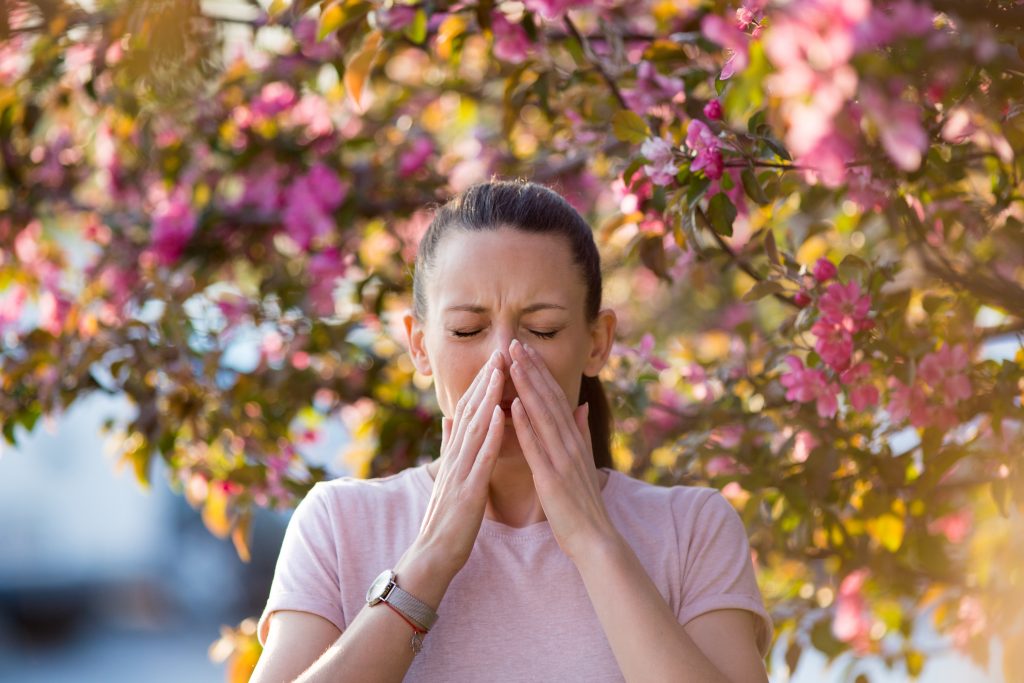March 18, 2022
Can Allergies Cause a Sore Throat?
A sore throat is a common complaint of people with allergies. Research shows that about 20% of people with allergies report a sore throat as a primary symptom.
The primary culprit of an allergy-related sore throat is postnasal drip. This occurs when congestion in your nose runs down the back of your throat.
When you have allergies, being exposed to an allergen such as animals (dander) or pollen can lead to sinus congestion. The congestion from your sinuses drains into the throat, causing pain, itchiness, tickling, and scratching sensations.
Common Symptoms of Allergies
In addition to a sore throat, other common allergy symptoms include:
- Congestion
- Itchy, watery, and red eyes
- Rash
- Runny nose
- Sneezing
What Happens When Exposed to Allergens
An allergen is a substance that causes an allergic reaction. After you’ve been exposed to an allergen, your body identifies it as a threat, and your immune system kicks into high gear to protect against the perceived threat. Your body will release histamines into your bloodstream, which is what leads to allergy symptoms, such as a sore throat.
Histamines also trigger your body to produce extra mucus to keep your mouth, nose, and throat from drying out. Most days, you don’t notice your body’s mucus production. But when your immune system releases too many histamines after being exposed to an allergen, this vigorous response leads to congestion, postnasal drip, and a sore throat.
Common Allergens
Common allergens that may cause post nasal drip and sore throat include:
- Animal dander (e.g., cats, dogs)
- Cigarette smoke
- Dust mites
- Mold and mildew
- Seasonal allergies (e.g., pollen)
Many allergies are seasonal. For example, when trees and flowers begin pollinating in the spring, you may notice that your symptoms worsen when more pollen is floating through the air.
Some allergies are year-round, and avoiding exposure to your allergens (e.g., dog dander) can help reduce your symptoms.
How To Prevent a Sore Throat From Allergies
To prevent a sore throat from allergies, you’ll want to take steps to limit your exposure to the substances you are allergic to.
Do your best to avoid known irritants, such as pet dander and cigarette smoke. If you have seasonal allergies — “hay fever” — caused by pollen when trees and flowers are in bloom, there are a few things you can do:
- Keep your doors and windows closed
- Wear a pollen mask outside during “allergy season” to protect yourself from airborne allergens
- Shower after coming in from outdoors
- Wash any clothing you wore outside
Remedies for a Sore Throat Caused by Allergies
Allergens can’t always be avoided, and sometimes you’ll end up with a sore throat after exposure. Fortunately, there are home remedies you can try to soothe a sore throat caused by allergies:
- Stay hydrated. Keeping yourself well-hydrated can help thin out excess mucus.

- Drink hot liquids. Tea with honey and soup broths may soothe a sore throat.
- Use a humidifier. Keep a humidifier running in your home. You may wish to add essential oils for their potential therapeutic benefits. One study found that lavender essential oil prevents allergy-related inflammation and mucus production.
- Keep your head elevated. If your allergy-related sore throat and congestion are keeping you up at night, try propping your head up with extra pillows to prevent mucus from collecting in the back of your throat.
- Over-the-counter (OTC) medications. There are many allergy medications available OTC, including antihistamines and decongestants. These are available in nasal spray, capsule, and liquid forms. Talk with your doctor about the most appropriate medication for your symptoms.
- Gargle with saltwater. Add ¼ to 1⁄2 teaspoon of salt in 8 ounces of warm water to gargle as needed. This may reduce inflammation and swelling and remove mucus to relieve your sore throat.
- Throat lozenges. Sucking on soothing lozenges (e.g., honey, lemon) can provide fast relief from allergy-related sore throats caused by excess mucus and coughing.
These remedies can provide temporary relief for sore throat, but they won’t prevent future allergic episodes.
If your sore throat and other allergy symptoms persist, you may need to speak with your doctor to ask about prescription medications or allergy shots.
Is My Sore Throat from Allergies or Something Else?
When you have allergies and are going through an allergic reaction, you may experience some of the same symptoms as you do when you have a cold or similar infection, including:
- Sneezing
- Stuffy, runny nose
- Fatigue
- Sore throat
Cold symptoms that don’t normally occur with allergies include:
- Fever
- Body aches and pains
- Thick and yellow or green mucus
Allergy symptoms that are less likely to occur when you have a cold include:
- Watery, red eyes
- Itchy nose, throat, and/or mouth
- Facial swelling
The time of year is imperative to keep in mind, too. You’re more likely to experience certain allergies in the spring and summer, and more likely to have a cold or other infection in the fall and winter months, depending on where you live.
However, mold and mold-related allergies can develop year-round, and exposure to pet dander can lead to postnasal drip and sore throat no matter the season.
If you’re still not sure what’s causing your sore throat, it may be time to make an appointment with a healthcare professional for an accurate diagnosis and treatment.
When to Seek Medical Attention
Postnasal drip and sore throat are among the most annoying and uncomfortable allergy symptoms, but they aren’t usually dangerous to your health. However, there are times when you may need to see your healthcare provider. Call your doctor if you have:
- Severe or worsening throat pain
- Sore throat with other symptoms, such as fever or bloody mucus
- Trouble breathing or swallowing
- Enlarged lymph nodes in your throat/neck
- Loss of voice
At Healthcare Associates of Texas, we have a team of dedicated, caring healthcare providers that offer specialized allergy services — from screening for allergies to effective treatments for mild to severe allergic reactions. Our team will provide a personalized plan designed for you to screen for and treat your allergies to help you feel your best.
DISCLAIMER
The information featured in this site is general in nature. The site provides health information designed to complement your personal health management. It does not provide medical advice or health services and is not meant to replace professional advice or imply coverage of specific clinical services or products. The inclusion of links to other web sites does not imply any endorsement of the material on such websites.